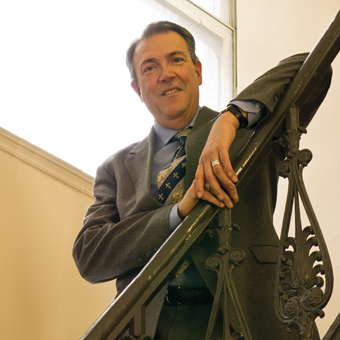Canon lawyer and charter member of the National Review Board Nicholas Cafardi talks about the importance of advisory boards and lay consultation.
[Read more from Nicholas Cafardi on the sex abuse crisis in the church.]
Is every diocese required to have a review board for cases of possible sexual abuse?
The norms that the U.S. bishops agreed to in 2002 state include that every diocese must have a review board that is to assist the bishop in evaluating the credibility of an accusation of sex abuse against a priest. That’s their role. The eventual decision is the bishop’s.
These review boards work when they’re properly used. We have all sorts of boards in our church. It’s not required, but it’s strongly recommended, for example, that every diocese has a pastoral council. If he wants to, in fact, the bishop is allowed to require all of his parishes to have a parish pastoral council. I’ve always thought this was interesting because parish pastoral councils are optional, while finance councils are obligatory. Every diocese has to have a finance council. Even every parish has to have a finance council, but they don’t have to have pastoral councils.
Canon law describes the diocesan finance council as experts in law and finance, which to me implies laypeople. Then there’s the diocesan presbyteral council, which is made up of representatives of the priests of the diocese, and the diocesan college of consultors, a smaller group of priests chosen by the bishop with whom he must consult on certain decisions.
Bishops have a lot of authority. So canon law, as a way to sort of “check” this power, specifies that bishops are meant to deal with and hear these councils when they are proposing major types of actions for their diocese, such as opening and closing parishes, extraordinary financial transactions, and the like. These boards are meant to help the bishop exercise prudently the immense authority that he has. If the bishop gets help making a decision, then he’s not relying on his whims. The whole point of these consultative bodies is to act as a check on the bishop and say, “Bishop, have you thought about this?” Ordination gives bishops authority; it doesn’t give them ability. You need both.
Do these types of boards work?
These boards are a great structure if they are properly used. They exist because the amount of authority and responsibility that a bishop has is huge. Nobody has the talent to do that all by himself. That’s why canon law built in these consultative bodies. In certain instances they’re deliberative not only on certain financial transactions but on other decisions as well. But even if they are just consultative, canon law says a bishop has to convene them. They’ve got to be brought together.
The boards have to have foreknowledge and be fully informed of what’s going to be discussed. The bishop has to listen, too. If he ignores their advice, he’s only to do that for grave reasons. That’s all in canon 127. If properly used, boards can keep bishops from being lone wolves and deciding, “I know best. I’ll make this decision on my own and not hear from anyone else.”
Does the review board work similarly to a finance council or diocesan pastoral council?
The review board is advisory. Many bishops, to their credit, have said they will never act against the advice of their review board. The 2002 norms make it very clear that review boards are to assist the bishop in making a judgment of whether or not a priest should remain in ministry.
But how can the board help you if they’re not told about certain cases, as happened in the recent cases in both Philadelphia and Kansas City?
Why wouldn’t the bishop tell the review board about certain cases?
I guess I keep coming back to this: We have a theological problem. We’re unwilling to give up the idea of bishop as the ruler of his diocese. I can think of only one time in which a non‑bishop body can overrule a bishop in his exercise of jurisdiction, and that would be the decisions of the diocesan finance council and the college of consultors on acts of extraordainary administration or alienations of church property above a certain value. If he wanted to sell the bishop’s mansion, for example, the bishop could not do that without the approval of the finance council and the college of consultors. But in almost every other type of situation, the decision is up to the bishop alone. He has to hear other bodies, like the presbyteral council or the consultors, but he doesn’t have to listen to them.
The Philadelphia review board chair wrote in a piece in Commonweal magazine that the board had canon lawyers sitting in on their meetings who repeatedly told them that in certain cases, according to canon law, what a certain priest had done was not technically abuse.
If you have canon lawyers who are mitigating the advice of diocesan review boards, then they’re doing a vast disservice to their church. One of the reasons for having diocesan review boards of laypeople was to break up the old boys’ club who said, in effect, “We’ve all got each other’s backs. We all watch out for each other, and if we see Joe make a mistake, well, that’s just Joe.” The reason for the lay review boards was to break that up. If you have a priest canon lawyer–and canon lawyers do tend to be priests, especially those working in-house for the diocese–sitting with the board, then arguably we’ve just inserted one of these old boys back into the network.
We often talk about priest abusers and bishop enablers, but are there ways in which lay people have been complicit in the sexual abuse crisis?
I’m not including victims and their families here, but as for laypeople in general, I think we’re too complacent about clericalism. We defer to clerical judgment. Even in the areas where we have expertise, we defer to clerical judgment. If a room is full of Catholic laypeople and there’s one collar in the room, who speaks the most? Who gets listened to the most? Part of the problem with clericalism is lay acquiescence in clericalism.
The promise of the Second Vatican Council that the laity shares the priestly, prophetic, kingly roles of Christ has yet to be delivered on. The council was 50 years ago, but we haven’t figured out in our church how we as laity exercise those roles. For example, I would say that review boards, to the extent they help a bishop govern the diocese, that’s the royal, the kingly role of the laity: “We are helping you exercise your powers of governance.” A good, smart bishop uses that. An insecure one says, “Nobody’s going to tell me what to do.”
How did clericalism and clerical culture contribute to the sex abuse scandals?
First of all, priests were too often looking out for fellow priests, making sure that no matter what they did, they didn’t get into trouble with the police.
Part of it is our theology. We believe that priests are ontologically different from the rest of us and therefore merit some kind of special treatment.
There was also the presumption that when it came to the word of the priest and the word of the victim, the priest was telling the truth. That’s full‑grown clericalism.
And then the bishops were unwilling to come down hard on their priests. Bishops were not even speaking to victims. They were only hearing the priest’s side of the story. Those are all, for me, aspects of clericalism that led to the crisis.
Why did the National Review Board call for meaningful lay consultation in the selection of bishops?
We wanted to see bishops who were connected to their clergy and connected to their people. With the system we have now, we usually parachute bishops in from headquarters. They don’t know their priests. They don’t know their people. Their loyalty is to those who sent them. Now, does it happen that bishops do put down roots, do get to know their priests? Yes. And there are many, many good bishops in America who have done that. On the other hand, we have careerists who are bishops. They don’t want to get to know the people or the priests. They aren’t going to be in their assigned diocese for very long. One of the phrases that I’ve heard used, which really troubles me, is, “Well that’s his starter diocese.”
When Cardinal Bernardin Gantin, who was for a long time a prefect of the Congregation for Bishops at the Vatican, left office, he gave an interview to a Roman newspaper in which he complained that he had been lobbied by bishops for bigger dioceses. I thought, I’m glad he at least said something, but it would have been nicer if he had said it when he was in authority. He said it disturbed him that as soon as a bishop got one diocese, he would start lobbying Gantin for the next, bigger diocese.
The more a bishop has loyalty to his people and his priests, the better that diocese will be. So the National Review Board asked for laypeople to have a say in who their bishops are. What do laypeople want in a bishop? They want a pastoral bishop. They want somebody who is going to come into their diocese and pastor them and make sure that they have what they need for their own eternal salvation and make sure that they have good priests.
One of the best quotes in our 2004 National Review Board report is from an unnamed bishop who said, “The best thing a bishop can do for his people is give them good priests.” But in order to do that, you need to know your people. You need to know your priests. We have a bit of a disconnect here. The way we choose our bishops is really headquarters-centered. That doesn’t mean we always get bad bishops. By and large I can’t say we have bad bishops. But it does mean that you have bishops who have to work really hard at getting to know their priests and getting to know their people.
This is a web-only article that accompanies We can do better, the full interview with Nicholas Cafardi on the sex abuse crisis 10 years later.
Image: Photo of Nicholas Cafardi by Tom Wright
















Add comment